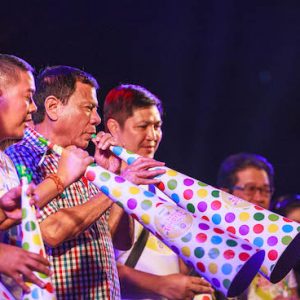I think I need to diversify my Following and watch list on Twitter. All I see are a bunch of “journalists” shrieking about the statement of President Rodrigo Duterte regarding his views on “bad” journalists and the fate they supposedly deserve.
Did Duterte really justify the killing of bad journalists? Who are we to judge? A wish to kill someone who threatens your existence or way of life is human nature. This is the reason we have laws. Laws are pieces of paper that separate civilised society from our animal heritage. Thing is, of the almost one million years that Homo Sapiens (and the tens of millions of years our parent Hominid genus) existed on this planet, civilisation existed for just 10,000 years at the most. And out of those 10,000 years of recorded human civilisation, only the generations who lived in the last couple of hundred enjoyed the nebulous notion of “human rights”.
The timeframe within which our convoluted rules that govern whether or not it is right to kill another human being is a mere blip in human existence.
Duterte, therefore, tests the foundations of Filipino society. Perhaps it can be argued that he can easily say things like that knowing that the rules will keep him in check anyway. But the way journalists cry bloody murder in quaint girly fits all over social media proves that Filipinos have little faith in their “democracy”. Even more disturbing, they have little faith in their president.
Who can blame them? No less than goody-two-shoes President Benigno Simeon ‘BS’ Aquino III back in 2015 himself hinted that some journalists end up dead by their own fault. The National Union of Journalists of the Philippines (NUJP) quoted the following excerpt from a statement issued by President BS Aquino in Belgium after he was queried on the “questionable” human rights record of his administration.
For instance, in the media killings, some who used to work in media died. Did they die because they were investigative journalists? Were they exercising their profession in a responsible manner, living up to journalistic ethics? Or did they perish because of other reasons?
To be fair, Filipino “journalists” can be el primo pricks. For that matter, their entire industry is made up of a small community of inbred minds who high-five one another in little cliques and use their journalism diplomas and employment credentials as rest-back when they get into Twitter “debates”. Does that make them better people? Bases for us to judge Filipino journalists abound on record in living colour.
Back in 2012, Philippine Media acted in virtuoso concert as an entire industry. It threw its awesome collecitve influence onto the task of demonising the late Chief Justice Renato Corona and conspired with a Senate kangaroo court to illegally acquire and disseminate ill-gotten “evidence” against him and, eventually, wrongly “convict” him. To this day, for example, “reporters” Magtanggol de la Cruz and Carmela Fonbuena of Rappler remain at large and free to continue their trade in “journalism” despite their alleged offenses against the Philippines’ bank secrecy laws.
Most disturbing of all, is how the Inquirer made fun of key Corona trial witness Demetrio Vicente, on its front page during that circus. The Inquirereditor seemed to think it was a grand idea exhibiting photos of Vicente with face grimacing in a pained attempt to overcome the persistent effects of a past stroke to attest to the character of Corona before the Senate “court”. One can imagine the editorial staff chuckling over beers as they laid out the proofs for the presses for this front page the previous night.

Philippine corporate media is an industry that has long imposed its self-ascribed moral ascendancy over the entire Philippine archipelago from their corporate ivory towers in Imperial Manila. The industry has, until now, enjoyed a virtual monopoly on thought leadership as foreign players have long been barred from participating in the lucrative Philippine market for news and ideas. Key “thought leaders” in the Philippines’ traditional media industry are mainly Tagalog-heads who dish out gospel-drivel and have come to regard themselves as gods before their legions of social media followers.
What we are seeing today is an entire pseudo-religious industry unsettled by a hefty counterweight to their northern lordship forming in the Philippines’ deep south in Mindanao. Duterte is the Philippines’ first Mindanaoan president, after all. He has been in public service over several decades largely free of a court populated by the who’s-who of Manila’s parasitical classes.
As such, one would be well-advised to excuse Duterte if he does not speak in a tone that fits well with Manila’s parasitical chatter. Southern dialects are structurally different from northern ones in that they are full of nuance and lack many of the terms of deference northern tribes are comfy with. As a result, southern Filipinos are perceived to be blunt and even bastos (rude) by the Philippines’ Imperial Tagalogs and Jesuit-educated Spanish elites.
But as to the task of being real, for a change, well, Duterte for now oozes with reality. The desire to kill an enemy hasn’t really disappeared from the human psyche. It is part of our very being. Nations such as the Philippines’ were forged upon blood spilt in countless battlefields. To rise above barbarism one has to recognise the reality of human nature and its propensity to violence that still resides in our brainstems. You need to build upon reality. A house built upon pretensions and political correctness will not stand for long.


No comments:
Post a Comment